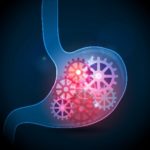At the very heart of it

I’ve just had a bit of a shock to the system, returning to freezing fog after a wonderful trip, visiting family and travelling with friends, in and around Cape Town. Three weeks of delicious food, wine, laughter and sunshine is incredibly good for the soul.
It wasn’t a completely easy ride, as we all suffered at some stage, with the dreaded travelling bug. Spending two days of the trip completely wiped out, with no interest in food, reiterated the impact the digestive system has on the rest of the body.
If our digestive system is operating below par, it will affect other parts of our body, perhaps without us even noticing. One of the most common problems is heartburn, so this month I’m going to look more closely at the all-important stomach, where this uncomfortable condition originates.
Handling heartburn
Heartburn (or indigestion), which is medically referred to as gastroesophageal reflux disease (GERD), occurs when stomach acid travels into the oesophagus and irritates the lining. As the name suggests, it creates a burning sensation in the chest, heart area or throat after eating. Some other symptoms include a change in the voice, hoarseness, a sour taste in the mouth, and general discomfort or bloating after a meal, particularly in the upper abdominal area.
If you have suffered from any of these symptoms, you may have reached for over-the-counter remedies, such as Gaviscon or Rennie. You might have visited your doctor and been prescribed proton pump inhibitors, which block the stomach’s ability to produce acid, and require continual use. Any of these remedies will ease the symptoms, but I prefer to find a solution, by looking at the root cause.
Look after your stomach and it will look after you
As discussed in my last newsletter, any pain or discomfort is the body’s way of signalling that something is wrong.
Stomach acid is a crucial part of the digestive system and it’s important to keep it where it belongs, rather than let it escape! It’s instrumental in breaking down proteins and activating minerals, and is essential for the absorption of vitamin B12. It also protects the body from bugs, by killing off bacteria and parasites, and plays a key role in a healthy immune system. As we age, the production of stomach acid declines, resulting in a weakened digestive function, so it’s important to bear this in mind and keep an eye on what and how we eat.
Kath’s tips for keeping heartburn at bay
- Eat slowly and take your time. It’s important to chew your food well, to give your stomach less work in the breaking down process; those extra chews really do make a difference! Eating slowly allows time for you to realise when you are getting full, and leaving a little space enables your stomach to easily digest the food.
- Enjoy your food. Appreciate the look and aromas of your food, making the most of your senses, other than just taste. This will trigger a response in your nervous system that encourages your stomach acid to kick in.
- Try not to drink too much liquid with meals. Sipping warm or room temperature liquids will ease digestion, but too much liquid will dilute the stomach acid, making it less effective.
- Once finished, sit for a little while if you can. Lying down too soon after eating can cause the stomach acid to travel where it shouldn’t! Try also to avoid eating on the run.
- Watch what you eat. Certain foods can trigger heartburn, the most common being spicy foods, coffee and dairy products. Also try to avoid refined foods. You may be sensitive to certain foods and this varies between individuals.
- Take Zinc and Vitamin B6 which help the body to produce its own stomach acid.
- Take a Digestive Enzyme or Betaine HCl and help restore the balance.
- Take a natural approach
If you are currently on medication to ease your heartburn symptoms and would like to wean yourself off, do get in touch and I can help you find the root cause.
